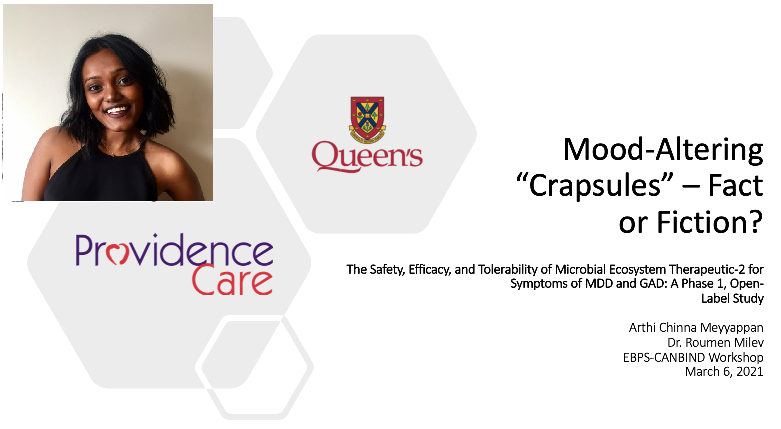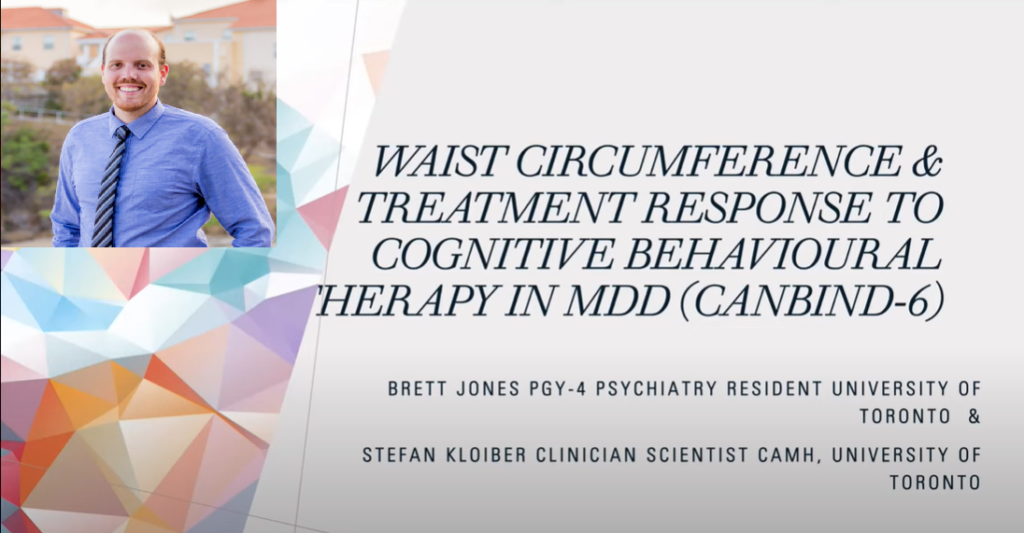EBPS-CAN-BIND Workshop: Behaviour to Biomarkers: Reverse Translation in 2021. Event Summary
On 05-06 March 2021, the European Behavioural Pharmacology Society (EBPS) and the Canadian Biomarker Integration Network for Depression (CAN-BIND) launched the 2021 EBPS-CANBIND Virtual Workshop with the exciting theme of ‘Behaviour to Biomarkers: Reverse Translation in 2021.’ This workshop featured special plenaries by eminent researchers in this field.
This workshop covered a wide range of preclinical and clinical research from graduate students to investigators. Attendees learned about the latest research in biomarker discovery in depression, addiction as well as novel therapeutics and the emerging role of the microbiome in mental health.
After the welcome address by EBPS president Dr. Louk Vanderschuren, the first plenary session on Strategies for Biomarker Discovery was chaired by Dr. Claudio Soares and featured CAN-BIND Project Lead, Dr. Sidney Kennedy giving us a clinical overview of the depression biomarker field with respect to CAN-BIND. Furthermore, Dr. Faranak Farzan spoke about how to approach the treatment of mental illness and addiction from a neuro-engineering perspective.
The following keynote address session was chaired by Dr. Jane Foster and given by Dr. Gustavo Turecki. It was a riveting presentation on multiomic approaches to biomarker discovery for antidepressant response.
One of the most engaging aspects of this workshop was the “Trainee Data Blitz” sessions with 5 sessions held over 2 days. These smaller, interactive sessions gave twenty trainees 15 minutes each to present their latest research.
Let’s hear from some of our CAN-BIND trainees about their experience at the workshop.

Arthi Chinna Meyyappan, Ph.D. Candidate, Centre for Neuroscience Studies, Queen’s University, Kingston, Ontario
“I learned so much from this workshop! From being able to speak about my own research to hearing some amazing presentations — all of it was truly great! My research is primarily in the field of gut-brain axis therapeutics for mood and anxiety disorders, so seeing Dr. Cryan, one of the biggest researchers in this field, was truly a pleasure! I also really enjoyed seeing students from all over talk about their related research as well. In fact, I’ve gotten in touch with a couple of them since for some potential collaborations!
The cool thing about research in the gut-brain axis is that because it is relatively new, I feel like I’m constantly learning something new every step of the way. When I started my Master’s project nearly 2 years ago there was next to nothing in this field so it’s been quite interesting over the past couple of years and degrees, to see the field grow. My Ph.D. project is primarily looking at the effects of microbial ecosystem therapeutics comprised of 40 strains of bacteria on depression and anxiety symptoms. The main learning point would definitely be surrounding the safety and efficacy of this product. I’d say another key learning point has been trying to understand and discern through my own research what a “healthy” microbiome may be. Hoping in the next 3 years I can take a good crack at answering some of these questions!”
Link: https://www.youtube.com/watch?v=BT7BIhWgc9Y

Brett Jones, PGY-4 Psychiatry Resident University of Toronto.
“The workshop was a fantastic opportunity to see the work showcased by researchers in North America and Europe. I was most particularly impressed by research into developing biomarkers for subtypes of depression such as anhedonia.
As a clinician, my research has always been motivated by improving care and alleviate suffering for persons with mood disorders. Through clinical trials and observational trials, I aim to improve treatments and our understanding of mood disorders. From this conference, I am excited about exploring how biomarkers discussed can be applied to clinical practice and further utilized to expand our understanding of the biology of mood disorders.”
Link: https://youtu.be/FNDliV3oJyo?t=2054

Victoria Marshe, Ph.D. Candidate, Institute of Medical Science, University of Toronto and CAMH
“As a CAN-BIND trainee, it was a unique privilege to participate in the workshop to learn from experts in the field and participate in the knowledge exchange with fellow trainees. The breadth of cutting-edge research topics and the depth of systems-oriented and innovative approaches was inspirational for me as an aspiring independent researcher.Regarding my research, we are interested in understanding how genetic risk scores for underlying medical conditions, such as Alzheimer’s disease and stroke, may affect how older adults respond to antidepressant medication. Our team uses artificial intelligence to address the following key question – can we predict if and how an individual will respond to antidepressant treatment? In a study of 1,304 individuals recruited across three well-defined cohorts, we observed up to a 48% correlation between the observed and predicted severity of depression after treatment, which is a promising pilot result. However, when we included genetic information, the model performance decreased, suggesting that we need to improve our understanding of integrating different data types to optimize model performance and capture the unique biological contributions to antidepressant response in older adults.”
Link: https://youtu.be/FNDliV3oJyo?t=1061
Writer: Dr. Wegdan Rashad Abdelmoemin
Editor: Dr. Jane Foster